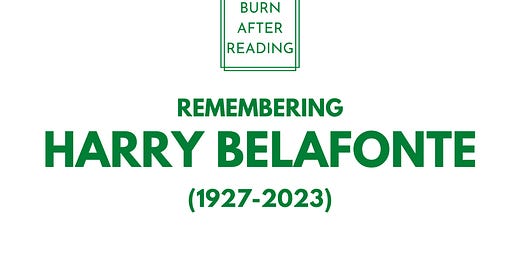Harry Belafonte, Patriot.
Drug policy reform was just another item on the seemingly endless list of good causes that the late Belafonte supported.
As soon as the news hit, you could almost hear the typing. The sound of thousands of writers springing into action, all trying to accomplish an impossible task: writing an obituary that does justice to the unbelievable life of Harry Belafonte (1927-2023).
Ultimately, it’s a fool’s errand. The man’s life story simply can’t be fully comprehended, let alone summarized. Not in a thousand words, or in a million.
You’ll have to forgive people my age for possibly being unaware of who Harry was. His contributions to popular culture are so ingrained in America’s collective cultural psyches, it’s understandable that one might assume that songs like Banana Boat Song (Day-O) and Jump in the Line have simply always existed. Older folks, so used to his presence, probably just assumed that everyone was born already knowing about Harry, much in the same way we don’t have to be taught how to breathe.
So I’ll try, in vain, to sum up his unbelievable bonafides: He was an EGOT winner. He was the first person in the world to sell a million records, and had a film career that stretched from Island in the Sun (1957) to BlacKkKlansman (2018). He was a personal friend of the likes of Martin Luther King Junior and Nelson Mandela. He was responsible for the recording of We Are The World, and for Jim Henson’s favorite Muppet Show episode of all time. He was an important member of the civil rights movement, and a mainstay in leftist activism circles for over half a century.
It would probably be more efficient to sum up his career by listing the accolades he somehow failed to achieve, then to attempt to list all the ones that he collected.
Of course, his immense influence — sometimes inconspicuous but always powerful — wasn’t just limited to pop culture. Blurring the line between superstar and activist, his abilities to entertain were so profound that even his biggest political enemies had to find themselves enthralled. He moved from the recording studio to the stage to the silver screen in a way that seemed impossible for anyone, let alone someone who was born into a mixed-race family in 1930’s Harlem and raised in Kingston, Jamaica.
Realizing that society’s gaze was going to follow him everywhere, he surrounded himself with people of substance, finding endless ways to hold up a mirror to force the audience to take a look at themselves.
Belafonte guest hosted the Tonight Show in 1968. One of the many notable guests he had on during that week was Robert Kennedy, just about a month before he was assassinated. In this clip, Kennedy discusses inequality in the country, using a comparison between tobacco and marijuana policies as an example.
Always dignified, the only time you would see Belafonte show any sense of fear was when a scene he was acting in required it. He chose his language carefully, speaking in a way that conveyed both confidence and humility, wielding harsh words as they ought to be used: sparingly and deliberately.
Various presidential administrations, prostate cancer, and endless threats of violence never deterred him from striving to hold truth to power.
From the anti-war movement, to the civil rights movement, to the LGBT rights movement, he was there. Even incidents that are now largely forgotten in popular history — such as the U.S. invasion of Grenada in 1983 — were not “insignificant” enough to avoid his ire.
Which brings us to drug policy reform, just another item on the seemingly endless list of good causes that Belafonte supported. At a time where support for marijuana legalization hovered below thirty percent, and people with substance abuse issues were treated with nothing but scorn, Harry played a key role behind the scenes in funding and supporting organizations like the Drug Policy Alliance. In 2001, he added his name to a letter sent to the UN’s World Conference Against Racism, noting the damages that the global war on drugs was doing to racial justice.
Long before the social equity movement, Harry was forming connections between the drug policy and racial justice movements that continue to influence policy today. He continued to support drug policy reform later in life, signing on to a letter supporting California’s Prop 64 in 2016.
Belafonte never rested. Now, mercifully, he does.
He was 96 years old.
This is Unsolicited Advice, my weekly column which is usually reserved for paid subscribers. If you’re not already a paid subscriber, please sign up to support my work.



